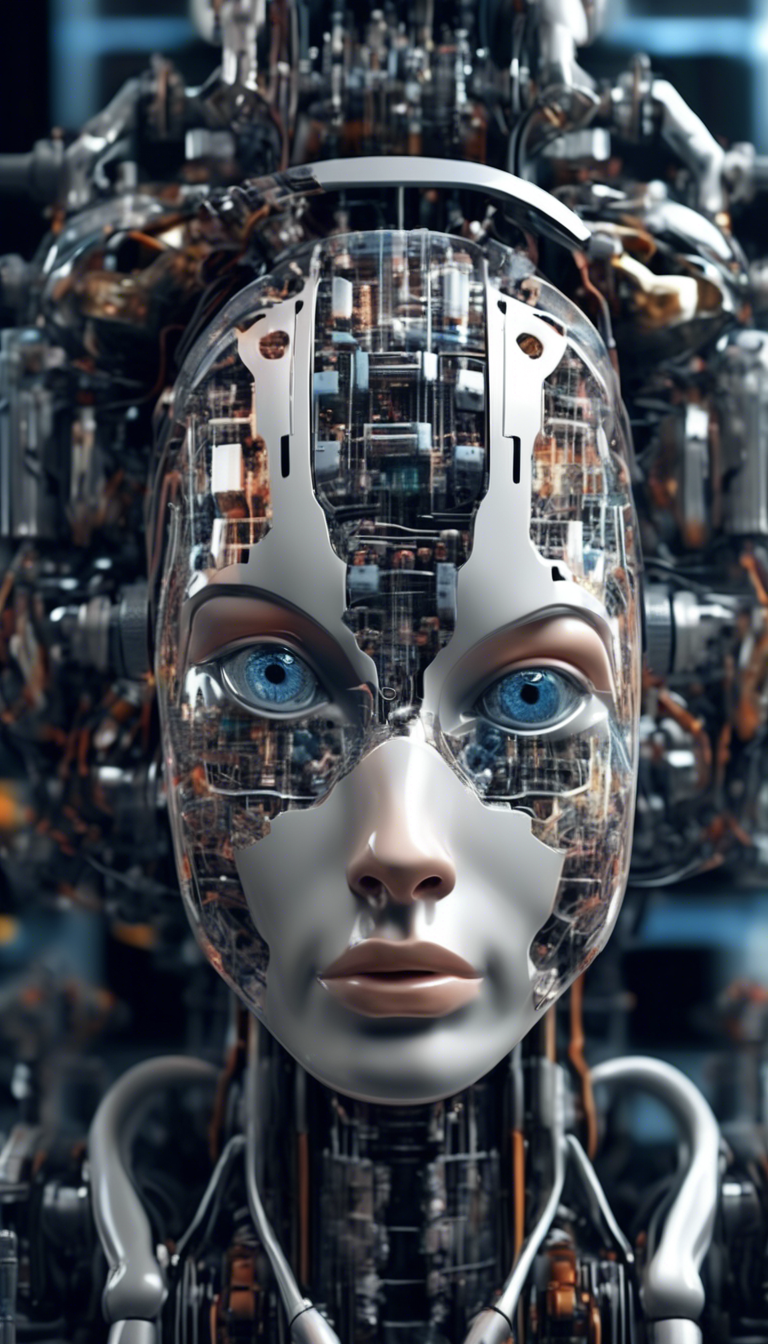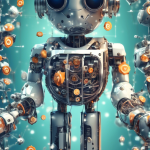The Role of AI in Enhancing Efficiency and Accuracy in Software Automation
In today’s fast-paced technological landscape, the integration of artificial intelligence (AI) into software automation has transformed how businesses operate. Companies are increasingly recognizing the necessity of enhancing efficiency and accuracy in their processes, and AI plays a pivotal role in this evolution. By automating routine tasks, minimizing human error, and offering data-driven insights, AI systems enable organizations to streamline operations and achieve better outcomes.
The Impact of AI on Workflow Automation
AI has significantly improved workflow automation by allowing businesses to optimize their processes. Traditional automation often relied on predefined rules and scripts. However, with AI, systems can learn from data over time, adapting and improving without constant human intervention. This capability leads to increased operational efficiency and a reduction in repetitive tasks.
- Intelligent Process Automation: AI systems utilize machine learning algorithms to analyze workflows, predict outcomes, and suggest modifications. This means businesses can proactively refine their processes, yielding higher productivity rates.
- Data Handling and Processing: AI excels at analyzing vast amounts of data rapidly. For instance, in software testing, AI-driven automation tools can sift through millions of lines of code to detect bugs or inconsistencies, ensuring higher accuracy than human testers.
Enhancing Accuracy through AI Technologies
One of the primary benefits of incorporating AI into software automation is the significant enhancement of accuracy. Manual processes are prone to human error, especially when data entry is involved. With AI, the risk of mistakes dramatically decreases. Here’s how AI boosts accuracy:
- Natural Language Processing (NLP): NLP enables AI to interpret and understand human language, making it invaluable for automating customer interactions through chatbots and virtual assistants. With real-time processing, these AI tools can provide accurate responses to customer inquiries without human assistance.
- Predictive Analytics: AI algorithms can analyze past data to forecast future trends. This predictive capability allows software to preemptively address potential issues, thereby ensuring continuous operational accuracy.
The Role of AI in Continuous Improvement
Integrating AI into software automation fosters a culture of continuous improvement. Organizations benefit from real-time feedback and analytical insights, enabling them to pivot swiftly when necessary. Continuous improvement in software automation manifests in several key ways:
- Feedback Loops: AI systems can create feedback loops where past performance is analyzed to inform future actions. This iterative process helps refine automation processes consistently.
- Customization: AI automation tools can learn from user behaviors, enabling them to adapt operations to better suit the needs of specific users or customers, thereby improving overall efficiency.
Challenges and Considerations
While the benefits of incorporating AI into software automation are numerous and compelling, it’s essential to acknowledge the challenges that come with it. Organizations must navigate the complexities of implementing AI technologies effectively. Some key considerations include:
- Data Privacy: Organizations need to ensure that the use of AI complies with data protection regulations to maintain customer trust.
- Integration with Existing Systems: The successful implementation of AI requires seamless integration with existing software solutions. Organizations must plan strategically to avoid disruption.
Future Trends in AI and Software Automation
The role of AI in software automation is constantly evolving. As technology advances, we can expect to see several trends shaping its future:
- Increased Adoption of AI-Powered Tools: More businesses will adopt AI-powered automation tools to stay competitive, leading to industry-wide improvements in efficiency.
- Focus on User Experience: As AI tools become more sophisticated, there will be a greater emphasis on enhancing user experience through personalized interactions and intelligent automation.
The seamless integration of AI in software automation is already reshaping the landscape of business operations. By enhancing efficiency and accuracy, AI provides organizations with the tools they need to thrive in an increasingly competitive environment. As advancements continue, the potential for AI in this domain appears limitless, paving the way for smarter, more adaptive software systems that can meet the dynamic demands of the future.
Future Trends: How AI Will Shape the Software Automation Landscape
As businesses continue to evolve, the integration of AI in software automation is becoming increasingly crucial. The future of software automation will be heavily influenced by artificial intelligence. This technology not only enhances operational efficiencies but also drives innovation across various sectors.
Enhanced Decision-Making
AI in software automation promises to improve decision-making processes. Algorithms can analyze vast sets of data faster than a human could, identifying trends and insights that might go unnoticed. This capability allows organizations to make informed choices in real-time. For instance, predictive analytics can forecast consumer behavior, enabling tailored marketing strategies and product development.
Streamlined Processes
Automating repetitive tasks is one of the core advantages of AI in software automation. Tasks that once required hours of manual labor can now be completed in minutes. Here are some areas where AI excels:
- Data Entry: AI can manage data extraction and entry, minimizing human error and improving accuracy.
- Quality Assurance: Automated testing powered by AI can identify defects and inconsistencies in software much quicker than manual testing.
- Customer Support: AI-driven chatbots provide instant responses to customer inquiries, improving service quality and reducing the workload on human agents.
By streamlining these processes, businesses can allocate resources more effectively, allowing human employees to focus on strategic and creative tasks.
Adaptive Learning
The future of software automation will see AI systems equipped with adaptive learning capabilities. These systems can learn from prior performance and make adjustments autonomously. Over time, they become more efficient, optimizing workflows without requiring constant human input. This adaptability not only improves task execution but also reduces operational costs.
For instance, an AI system analyzing software deployment processes may notice inefficiencies and suggest optimizations based on historical data. This continual improvement loop makes AI a vital partner in software automation.
Improved Security
In an era where data breaches and cyber threats are rampant, security is paramount. AI’s role in enhancing software security cannot be overstated. AI can rapidly analyze patterns and detect anomalies that might signify a potential data breach or security issue.
Some key security aspects include:
- Proactive Threat Detection: AI systems can identify threats before they manifest, allowing businesses to take action swiftly.
- Automated Incident Response: In the event of a security breach, AI can automate immediate responses, mitigating damage.
- Continuous Monitoring: AI tools can perform round-the-clock monitoring without fatigue, ensuring a robust security posture.
These security enhancements not only protect valuable data but also foster trust with customers.
Integration with IoT
The synergy between AI and the Internet of Things (IoT) will shape the future of software automation significantly. IoT devices generate massive amounts of data, and AI can analyze this data to improve operational efficiencies.
Consider a smart factory where AI-driven software automates machinery operations. By analyzing data from IoT sensors, AI can predict maintenance needs before equipment fails, thus minimizing downtime and optimizing production efficiency.
The Rise of Citizen Developers
The democratization of technology is growing, and AI in software automation is at the forefront of this trend. Citizen developers, or non-technical employees, can use AI-powered tools to build and implement automation workflows without extensive programming knowledge. This shift allows for greater flexibility in software development and empowers all employees to contribute to process improvements.
Final Thoughts
The integration of AI in software automation is not just a trend; it’s the future of how businesses operate. From enhancing decision-making to streamlining processes, the advantages are clear. As organizations embrace this technology, they stand to gain a competitive edge, adapt to market needs, and foster more efficient workplaces. Embracing AI is no longer optional—it’s imperative for future success.
The shift towards AI-driven software automation heralds a new era in business efficiency and innovation, paving the way for smarter, more responsive organizational landscapes.
Conclusion
As we navigate through the evolving landscape of software automation, it becomes increasingly clear that artificial intelligence (AI) is not just an add-on; it’s an integral foundation upon which future innovations will be built. The role of AI in enhancing efficiency and accuracy in software automation cannot be overstated. By driving automation processes to unprecedented levels, AI enables organizations to reduce human error, optimize workflows, and ultimately achieve significant cost savings. This shift is sculpting a new era of productivity, where repetitive and routine tasks are managed by intelligent systems, freeing human resources for more strategic and creative endeavors.
Efficiency gains powered by AI are primarily achieved through machine learning algorithms that analyze vast datasets at lightning speed. This ability to process information in real-time allows software applications to adapt swiftly, making decisions based on historical data and emerging patterns. As a result, businesses can enhance their operations in ways that were previously thought unachievable. For instance, companies employing AI-driven automation tools can significantly decrease the time it takes to deliver solutions to market, a vital advantage in today’s fast-paced digital economy. Imagine a scenario where a software development team spends less time on debugging and more on innovation, all thanks to AI’s ability to identify and rectify issues before they escalate.
However, the transformative potential of AI in software automation doesn’t stop there. As we look at future trends, it becomes evident that AI will continue to shape the software automation landscape in profound ways. One key trend to watch is the rise of hyper-automation, where AI and machine learning work together with robotic process automation (RPA) to automate complex business processes beyond simple tasks. This synergy promises a future where entire workflows can be managed without human intervention, leading to enhanced efficiency across various sectors. Businesses will no longer be limited by the capabilities of traditional automation; instead, they will harness AI to create end-to-end automated solutions capable of unprecedented cognitive tasks.
Another trend to keep an eye on is the increasing focus on AI explainability. As organizations integrate AI deeper into their processes, understanding the decision-making mechanisms of these systems will become essential. This need for transparency will drive the development of more intuitive user interfaces and dashboards that demystify AI actions. Consequently, stakeholders will gain better insights into how decisions are made, fostering trust and adoption of AI solutions that support software automation.
Security will also play a significant role in shaping the future of AI in software automation. As automation processes become more complex, the need for robust security measures to protect sensitive data will rise. AI will be instrumental in this regard, offering real-time monitoring and anomaly detection capabilities that can identify potential threats as they arise. By embedding security protocols within autonomous systems, businesses can proactively prevent breaches rather than merely reacting after incidents occur.
The shift toward AI-powered software automation will also have implications for workforce dynamics. As AI continues to handle routine tasks, the human workforce will transition towards roles that require critical thinking and emotional intelligence. This evolution calls for a reevaluation of training programs and educational curricula to equip future professionals with the skills necessary to thrive in this AI-driven environment. Upskilling and reskilling initiatives will become paramount as workers adapt to new roles that collaborate closely with intelligent systems.
The confluence of AI and software automation marks a watershed moment for industries across the globe. As organizations begin to embrace these advancements, they must remain mindful of the ethical considerations surrounding AI deployment. Issues such as algorithmic bias and job displacement should prompt thoughtful discussions among leaders, paving the way for strategies that maximize benefits while mitigating risks.
The path ahead is filled with promise. By leveraging AI’s capabilities in software automation, companies can unlock new heights of efficiency, redefine operational paradigms, and remain agile in a rapidly changing business environment. The real power of AI lies in its ability to augment human effort, not replace it. Ultimately, businesses that approach this technology with an open mind will not only adapt but thrive, setting a precedent for innovation and excellence in the years to come. The future is now, and software automation is guiding us toward an intelligent era where the possibilities are limitless.


